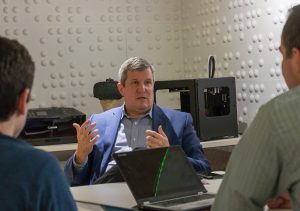When Doug Mellinger ’87 did not fit the mold of a typical Syracuse University student, he didn’t give up. Instead, he crafted his own major and founded multiple organizations. This is how an entrepreneur gets their undergraduate degree.
Originally from Westchester, New York, Mellinger started his first company at 13. He mowed lawns, tarred driveways, and plowed snow. His entrepreneurial edge only expanded in his middle school years, influencing his collegiate education. Mellinger arrived at Syracuse University in 1982, and began his academic career as a computer science major. However, he noticed the word “entrepreneur” on a poster in the business school and thought the word was completely fascinating.
Immediately, he knew he wanted to become an entrepreneurship major. But it wasn’t quite that simple. In 1982, Syracuse University did not offer a major in the field, and Mellinger received pushback after approaching multiple advisors.
After many meetings and a few dead ends, Mellinger met with the Dean of Student Affairs. The Dean told him that it was possible a way to create your own major at the University. It was called “selective studies.” Mellinger seized the opportunity and became the first person at Syracuse to graduate with a bachelor’s in entrepreneurship.
The experience inspired Mellinger to create the Association of Collegiate Entrepreneurs (ACE), which is now an international organization with over 600 universities that fosters and supports youth entrepreneurship.
He continued his success by developing a software company, venture capitalist work and founding multiple other companies. Along the way, his passion for philanthropic activities thrived in both non-profit and government sectors.
Since 1982, some things have changed, according to Mellinger.
Syracuse University: Tech and Innovation

Doug Mellinger speaks with students in the iSchool’s NEXIS lab during a recent visit to campus.
“Well, there are a lot more buildings, for starters,” Mellinger said. “Especially with the iSchool, there have been changes. It used to be library science. The cross over between information and data with business is unique. The fact that the school has embraced to the degree that they have is something that wouldn’t have happened back in the 1980s. I have been very impressed with all the programs to foster this growth in entrepreneurship.”
Mellinger noted that in the 1980s, the innovative spirit was not as prevalent. Academics were much more “siloed” into specific academic categories. Now, students have more flexibility to craft unique majors as Mellinger once did.
“Academia still has a bit of a problem when schools fight for credit hours. This comes down to budgets and how much funding a school gets,” he said. “We need to deal with how the world is changing and how we learn. The iSchool understands this issue.”
Mellinger grew up in an entrepreneurial environment. Both of his parents started their own companies. But when it came down to it, Mellinger was naturally entrepreneurial before he knew the word “entrepreneurship.” He discovered from a young age he was able to make more money hiring people to mow lawns when he managed the company himself.
As far as being technologically innovative, Mellinger understands the importance of being on top of the trends in the industry.
“Noting new trends and understanding if this is good investment for business we invest in is crucial,” he said. “Social apps will have significant impacts on products sold to consumers. So no, I’m not an expert, but it’s important I know what’s happening.”
What About a Career in Technology?
Mellinger noted both the excitement and unpredictable aspects of going in a career of technology at this point in time.
“It’s supremely frightening. Technology innovation is coming at a rate that humanity has never seen before. If you go back a few years ago, development took decades before it would go into mass development,” he said. “You used to have to own a data center for a business, now you can lease one. The speed at which technology is being adopted is insane.”
Taxi medallions in New York City, Mellinger pointed out, are nearly irrelevant compared to Uber’s infiltration. The tech industry is disrupting every traditional aspect of the world.
“It was assumed that tech would impact [jobs] like receptionists. So many jobs are called into question … there is virtually no job that is not at risk,” Mellinger said. “Companies that we might have invested in … we have to pay attention to if the careers in the field will exist. You have to be smart, in whatever path you take.”
